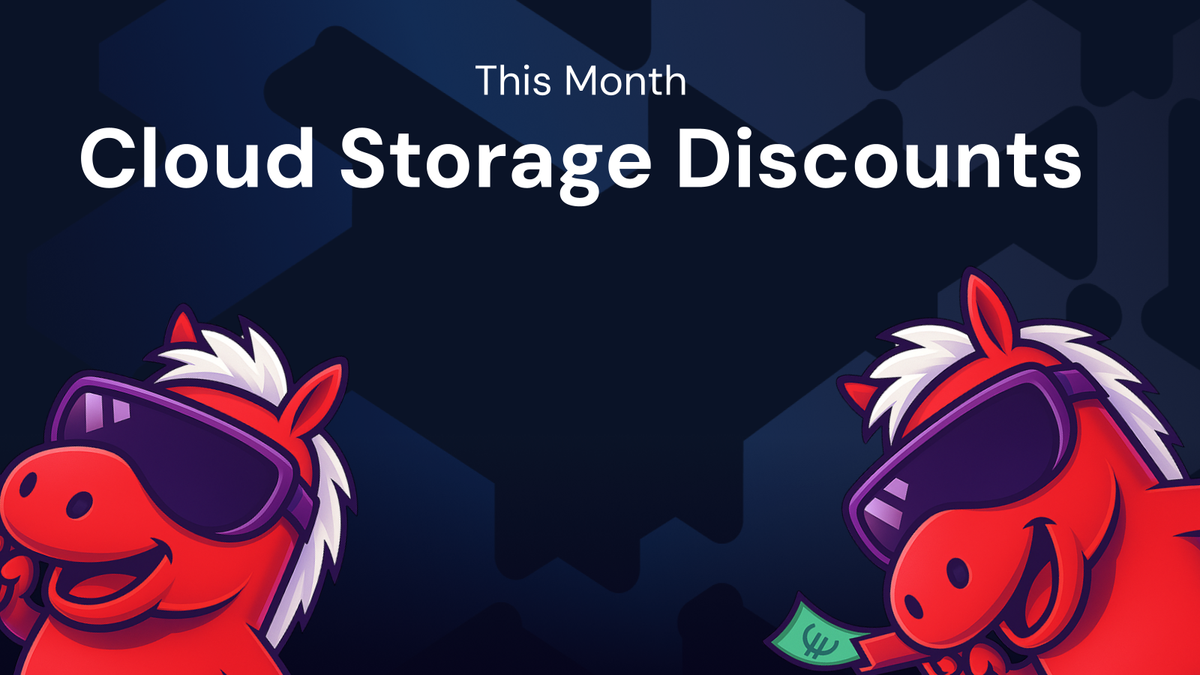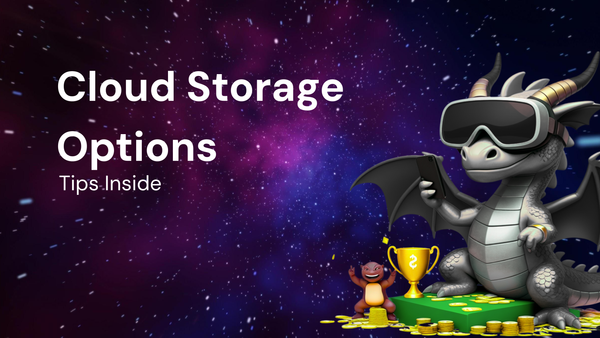Freemium Vs Premium to Get the Best cloud storage discounts This Month

Freemium Vs Premium to Get the Best Cloud Storage Discounts This Month
Cloud storage has become an indispensable tool in the modern digital landscape. Whether you're a student, a professional, or simply someone looking to back up precious memories, cloud storage offers convenience, security, and accessibility. But with a plethora of options available, choosing the right plan can be daunting. Many providers offer both "freemium" and "premium" tiers, each with its own set of advantages and disadvantages. This article aims to dissect the differences between freemium and premium cloud storage, providing you with the information you need to make an informed decision and potentially snag the best cloud storage discounts available this month.
Understanding Freemium Cloud Storage
The "freemium" model, a portmanteau of "free" and "premium," is a popular strategy employed by many cloud storage providers. It essentially offers a basic level of service free of charge, with the intention of enticing users to upgrade to a paid premium plan for more features and storage capacity.
Key Characteristics of Freemium Cloud Storage:
- Free Storage Allowance: This is the primary draw of freemium plans. Users typically receive a limited amount of storage space (e.g., 2GB, 5GB, 15GB) without any cost.
- Basic Features: Freemium plans usually include fundamental features such as file uploading, downloading, sharing, and syncing across devices.
- Limited Functionality: Advanced features like advanced collaboration tools, enhanced security options, priority support, and larger file size limits are generally restricted to premium users.
- Advertisements and Promotions: Providers may display advertisements or promotional offers within the free service to encourage users to upgrade.
- Upselling Tactics: Freemium models inherently involve upselling strategies. Providers actively promote the benefits of premium plans to encourage conversion.
- Accessibility: Generally very easy to sign up and get started with.
Pros of Freemium Cloud Storage:
- Cost-Effective Entry Point: Ideal for users with minimal storage needs or those who want to try out a service before committing to a paid plan.
- Ease of Use: Freemium plans are often straightforward to set up and use, making them accessible to a wide range of users.
- Sufficient for Basic Needs: Perfect for storing documents, small photos, or other essential files.
- Opportunity to Evaluate the Service: Allows users to test the platform's interface, speed, and reliability before making a purchase.
Cons of Freemium Cloud Storage:
- Limited Storage Space: The most significant drawback is the restricted storage capacity, which can quickly become insufficient as your data grows.
- Feature Restrictions: Access to advanced features and functionalities is typically limited or entirely unavailable.
- Potential Security Concerns: While reputable providers offer basic security measures, freemium plans may lack the robust security features found in premium plans. Look for providers with end-to-end encryption, two-factor authentication, and compliance with relevant data privacy regulations.
- Advertisements and Promotions: The presence of ads can be distracting and detract from the user experience.
- Bandwidth Limitations: Upload and download speeds may be throttled on free plans.
- Lack of Priority Support: Getting assistance with freemium accounts can be slow or non-existent compared to premium support.
Who is Freemium Cloud Storage Best For?
Freemium cloud storage is best suited for:
- Users with small storage needs: Those who only need to store a few essential documents or files.
- Beginners: Individuals who are new to cloud storage and want to test the waters.
- Budget-conscious users: People who are not willing or able to pay for cloud storage.
- Short-term storage needs: Temporary storage for projects or file sharing.
- Experimenting with different providers: Trying out multiple services to find the best fit.
Exploring Premium Cloud Storage
Premium cloud storage plans represent the paid tiers of service offered by cloud storage providers. These plans unlock a wealth of features, increased storage capacity, and enhanced performance compared to their freemium counterparts.
Key Characteristics of Premium Cloud Storage:
- Increased Storage Capacity: Offers significantly larger storage allowances, ranging from hundreds of gigabytes to several terabytes or even unlimited storage in some cases.
- Advanced Features: Includes features like version history, advanced sharing permissions, collaborative editing, enhanced security options (e.g., encryption, two-factor authentication), and priority support.
- Ad-Free Experience: Eliminates advertisements and promotional content, providing a cleaner and more professional user experience.
- Higher Bandwidth: Offers faster upload and download speeds for improved performance.
- Dedicated Support: Provides access to dedicated customer support channels, ensuring prompt assistance with any issues.
- Regular Backups: Some premium providers offer automated backup options for peace of mind.
- Compliance: often adheres to strict regulatory compliance standards.
Pros of Premium Cloud Storage:
- Ample Storage Space: Provides sufficient storage for large files, photos, videos, and entire system backups.
- Enhanced Features: Unlocks advanced features that improve productivity, collaboration, and security.
- Improved Security: Offers robust security measures to protect your data from unauthorized access.
- Faster Performance: Delivers faster upload and download speeds for a more efficient workflow.
- Priority Support: Provides access to dedicated customer support, ensuring prompt assistance.
- Ad-Free Experience: Eliminates distractions and provides a cleaner user interface.
- Peace of Mind: Ensures data security, reliability, and accessibility.
Cons of Premium Cloud Storage:
- Cost: Requires a recurring subscription fee, which can be a barrier for some users.
- Commitment: Often involves a subscription agreement, requiring users to commit for a specific period.
- Feature Overload: The abundance of features can be overwhelming for some users.
- Complexity: Setting up and configuring advanced features may require technical expertise.
Who is Premium Cloud Storage Best For?
Premium cloud storage is best suited for:
- Users with large storage needs: Individuals or businesses with substantial data storage requirements.
- Professionals and businesses: Users who require advanced features for collaboration, security, and productivity.
- Photographers, videographers, and creatives: Users who need to store and share large media files.
- Those who prioritize security and reliability: Individuals and businesses who need to protect sensitive data.
- Users who require priority support: Those who value prompt and reliable customer service.
- Teams that collaborate regularly: Premium features often include extensive collaboration features that free versions lack.
Freemium Vs Premium: A Feature-by-Feature Comparison
To further illustrate the differences, let's compare the features offered by freemium and premium cloud storage plans side-by-side:
| Feature | Freemium Cloud Storage | Premium Cloud Storage | | ------------------- | ---------------------------------- | ---------------------------------- | | Storage Capacity | Limited (e.g., 2GB, 5GB, 15GB) | Larger (e.g., 100GB, 1TB, Unlimited) | | File Size Limit | Restricted | Higher or No Limit | | Advanced Security | Basic Encryption | Advanced Encryption, 2FA, Compliance | | Version History | Typically Not Available | Available | | Sharing Permissions | Basic Sharing | Granular Permissions & Control | | Collaboration Tools | Limited | Extensive Collaboration Features | | Bandwidth | Throttled | Higher Speed | | Customer Support | Limited or None | Priority Support | | Advertisements | Present | Absent | | Cost | Free | Paid Subscription | | Backup Options | Limited or Manual | Automated and Comprehensive |
Finding the Best Cloud Storage Discounts This Month
Now that you understand the differences between freemium and premium cloud storage, let's explore how to find the best discounts available this month. Keep in mind that promotions change frequently, so be proactive!
1. Research and Compare Providers:
- Identify your needs: Determine your storage requirements, desired features, and budget.
- Create a shortlist: Research and identify several cloud storage providers that meet your criteria.
- Compare features and pricing: Use comparison tables and reviews to compare the features and pricing of each provider.
- Read customer reviews: Check independent review sites and forums to gauge customer satisfaction.
Start your search with these well-known cloud storage providers:
- Google Drive: Widely used and integrated with Google Workspace. Search for "Google Drive Storage Plans" to find the most current pricing.
- Microsoft OneDrive: Integrated with Microsoft Office and Windows. Look for "Microsoft 365 Personal vs Family" to check the bundled storage offers.
- Dropbox: Popular for file sharing and collaboration. Search for "Dropbox Plans and Pricing".
- pCloud: Known for its focus on security and privacy. Look for "pCloud Lifetime Plans".
- Box: Geared towards businesses and enterprise users. Search for "Box Business Plans Pricing".
- iCloud Drive: Primarily used by Apple device users. Look for "iCloud Storage Plans".
- MEGA: Offers generous free storage and end-to-end encryption. Search for "MEGA Storage Plans".
- IDrive: Good backup solutions across many devices. Search for "IDrive Personal Plans".
2. Check for Limited-Time Promotions and Discounts:
- Visit provider websites: Check the official websites of cloud storage providers for ongoing promotions and discounts.
- Subscribe to newsletters: Sign up for email newsletters to receive exclusive offers and early access to sales.
- Follow social media: Follow providers on social media platforms to stay informed about promotions and contests.
- Search for coupon codes: Use search engines to find coupon codes and discount codes. Try searching for terms like "[Provider Name] coupon code" or "[Provider Name] promo code." Example: "Dropbox coupon code".
- Look for student or educational discounts: Many providers offer discounted rates for students and educators.
- Seasonal Sales: Look for deals around major holidays and events, like Black Friday, Cyber Monday, back-to-school sales, and end-of-year promotions.
- New Customer Offers: Many services provide an initial discount for the first month or year.
3. Consider Bundled Deals:
- Software bundles: Cloud storage is often bundled with other software or services, such as office suites or security software.
- Hardware bundles: Some hardware manufacturers offer cloud storage subscriptions with their devices.
- ISP and telecom bundles: Check with your internet service provider or telecom company for potential bundled deals.
4. Explore Lifetime Deals:
- Lifetime subscriptions: Some providers offer lifetime subscriptions for a one-time fee. While these deals can be attractive, consider the provider's long-term viability before committing. Caveat emptor (buyer beware) applies here.
- Check reputable deal sites: Keep an eye on sites like AppSumo which sometimes offers lifetime deals on various software, including cloud storage solutions.
5. Leverage Referral Programs:
- Refer friends and family: Many providers offer referral programs that reward you with extra storage or discounts when you refer new users.
- Check the terms: Understand the limitations and requirements of the referral program.
6. Pay Attention to Renewal Prices:
- Introductory rates: Be aware that some providers offer discounted rates for the first year or term, but the renewal price may be significantly higher.
- Read the fine print: Carefully review the terms and conditions of the subscription agreement to understand the renewal pricing.
7. Consider Long-Term vs. Short-Term Needs:
- Evaluate your long-term storage needs: If you anticipate your storage needs growing significantly over time, opt for a plan that offers scalability and flexibility.
- Choose a plan that aligns with your budget: Consider the long-term cost of the subscription and choose a plan that fits your budget.
8. Security Considerations When Choosing a Discounted Plan:
Be very careful when a deal looks too good to be true. Ensure that heavily discounted plans don't skimp on critical security features. Check the following:
- Encryption: Does the provider offer encryption both in transit and at rest? End-to-end encryption is the gold standard.
- Two-Factor Authentication (2FA): Is 2FA available to protect your account from unauthorized access?
- Data Privacy: Understand where your data is stored and the provider's data privacy policies. Are they compliant with regulations like GDPR?
- Reputation: Check the provider's reputation and security track record. Have they had any past security breaches?
9. Don't Be Afraid to Negotiate:
- Contact sales: If you are considering a large subscription, don't hesitate to contact the provider's sales team and negotiate a better price.
- Mention competitor offers: Let the provider know if you have received a better offer from a competitor.
10. Monitor Expiration Dates:
- Keep track of promotions: Note the expiration dates of any promotions or discounts you are considering.
- Act promptly: Take advantage of deals before they expire.
Conclusion: Finding the Right Balance
The choice between freemium and premium cloud storage ultimately depends on your individual needs, budget, and priorities. Freemium plans offer a cost-effective entry point for basic storage needs, while premium plans provide ample storage, advanced features, and enhanced security for more demanding users. By carefully evaluating your requirements, researching available options, and leveraging discounts and promotions, you can find the perfect cloud storage solution to meet your needs and budget this month. Remember to prioritize security and read the fine print before committing to any plan. By doing your due diligence, you can ensure that your data is safe, accessible, and secure in the cloud.




